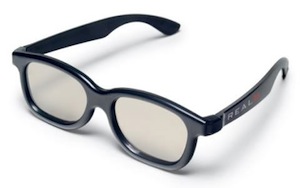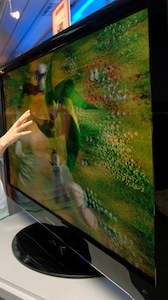Will we all watch 3D TV in the future, or will it remain a niche product meant for science fiction movies, video games, or special sporting events? As we’ve seen with the breakout success of the movie Avatar, there is definitely consumer willingness to enjoy 3D at the movies. But, it is still an open question whether consumers will buy a 3D experience for the home. Here are ten reasons why in-home 3D TV may never achieve mass market appeal.
-

Glasses
Need I say more. Who wants to buy them, keep track of them, or even wear them? Are you eager to wear geeky 3D glasses and sit silently in front of a TV in a darkened room every night? - TV Watching is Social
Home TV watching is in many ways a social experience. You watch with your family or friends with the lights on. You may talk about the show or something else. Multitaskers may even be on the Internet, chatting, tweeting or texting from their phone. 3D viewing abruptly alters the social nature of TV watching. - Compatibility
Think the brand new flat panel TV you bought recently will show 3D? Think again. You will need to upgrade just about everything including the cables. - Lack of content
Even if you are fortunate enough to buy a 3D TV when they first come out, along with a 3D Blu-ray player, you won’t have much to watch. Even if you could watch more, what do you really have to watch in 3D? - Confusion
3D adds a new layer of complexity to the already complicated TV, satellite/cable, dvd player hook-up process. New technical 3D jargon will further confuse consumers. There are currently different ways to capture and display 3D, which can require different types of glasses and/or equipment. Confused yet? So am I. - Health risks
3D viewing can induce headaches, disorientation, nausea, or eye-strain for some people. 3D tricks the brain and puts your eyes through a serious workout. Nobody knows yet, since there have been no major studies what, if any, long-term effects extensive 3D watching may cause.
- Unwatchable 3D Footage
3D video is unwatchable without special glasses. If you were told right now your TV would only work if you wore special glasses, how many of those TVs do you think would sell? Admittedly that is an untrue example, but it’s still the same question consumers will answer with their purse strings. - Just Good-enough Syndrome
This is not a disease, but many people are quite happy with their new flat panel TV purchase of recent years. At the same time everything is not yet broadcast in full HD and the majority are still happy with regular DVD quality. Even the blu-ray market has yet to take off. Convincing consumers to adopt a new format may be a tough sell. - Discs are dying
No funerals please. With improved streaming capabilities and greater digital home storage, inevitably discs (cd, dvd and blu-ray) will be replaced with on-demand streaming. It may take another decade, but how we consume media will likely not include discs. This isn’t necessarily bad for 3D, but it takes 2-4 times more storage and greater download speeds to stream 3D. Bandwidth limitations are likely to be an issue. - History Lessons
Bringing sweeping change to home TV watching takes time, a very long time. It took HDTV about 20 years to achieve market dominance with the help of a government mandate. For better or worse, I don’t expect government involvement this time. The electronics and entertainment industries will have their work cut out for them.
Article by Brian Mitchell, Founder & CEO, eCoustics.com






























